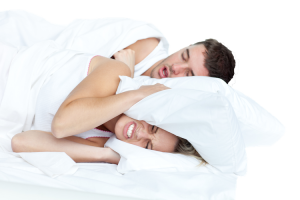When many people think of sleep apnea they immediately think of snoring. However, it is important to understand the difference between the two. While some people suffering from sleep apnea might snore, not all actually do. Let’s take a look at sleep apnea, snoring and what the difference is.
What’s the Difference?
First, let’s look at the definitions of snoring and sleep apnea. Obstructive sleep apnea (OSA) is a sleep disorder in which breathing is briefly and repeatedly interrupted during sleep. The “apnea” in sleep apnea refers to a breathing pause that lasts at least ten seconds and occurs when the muscles in the back of the throat fail to keep the airway open, despite efforts to breathe. On the other hand, snoring is a noisy sound that occurs when there is an obstruction to the free flow of air through the passages at the back of the mouth and nose. This area is the collapsible part of the airway where the tongue and upper throat meet he soft palate and uvula. Snoring occurs when these structures strike each other and vibrate during breathing.

And, according to the National Sleep Foundation, more than 18 million American adults currently suffer from sleep apnea while approximately 45% of normal adults snore at least occasionally and about 25% are habitual snorers.
So, what’s the difference? While snoring might be a common symptom of sleep apnea—we can agree on that—it doesn’t mean you have sleep apnea. Just like if you have sleep apnea it does not necessarily mean you will snore. Either way, it is important to seek medical attention for proper diagnosis and treatment options. If you snore and might be concerned that you have sleep apnea, talk to your dentist or doctor—it is better to be safe than sorry.
If you have any questions about snoring and sleep apnea, please contact Sweet Dreams Sleep Solutions. We can work with you to determine if your snoring is sleep apnea, or if it is just plain-old snoring.
